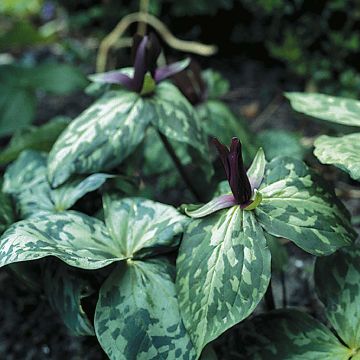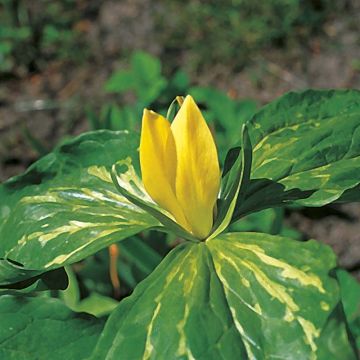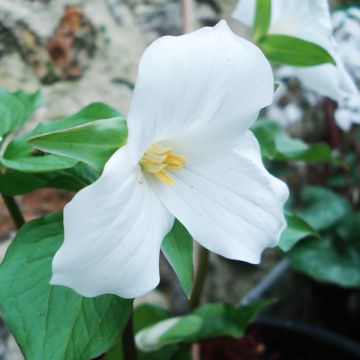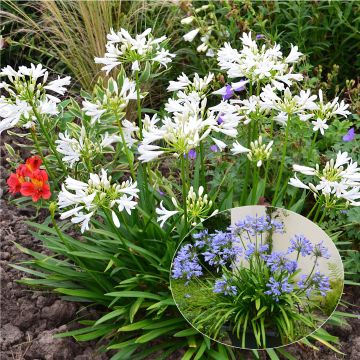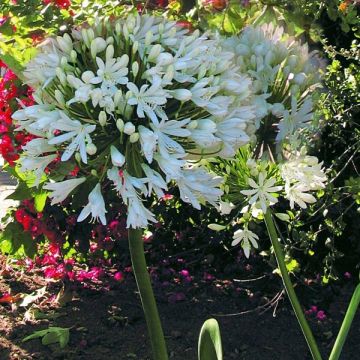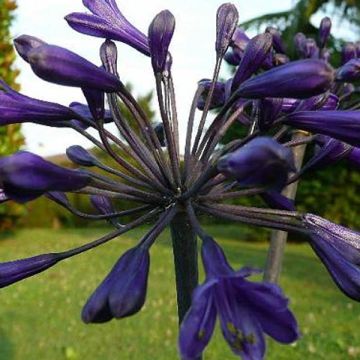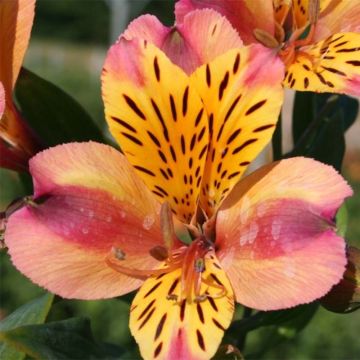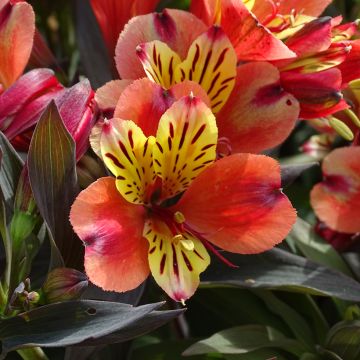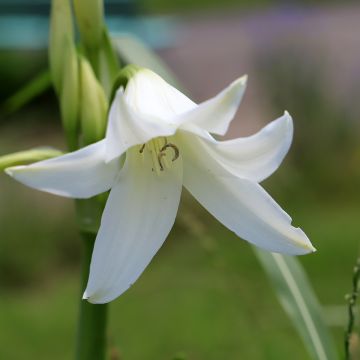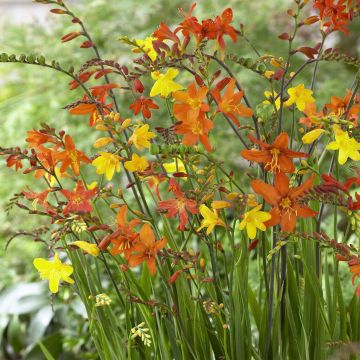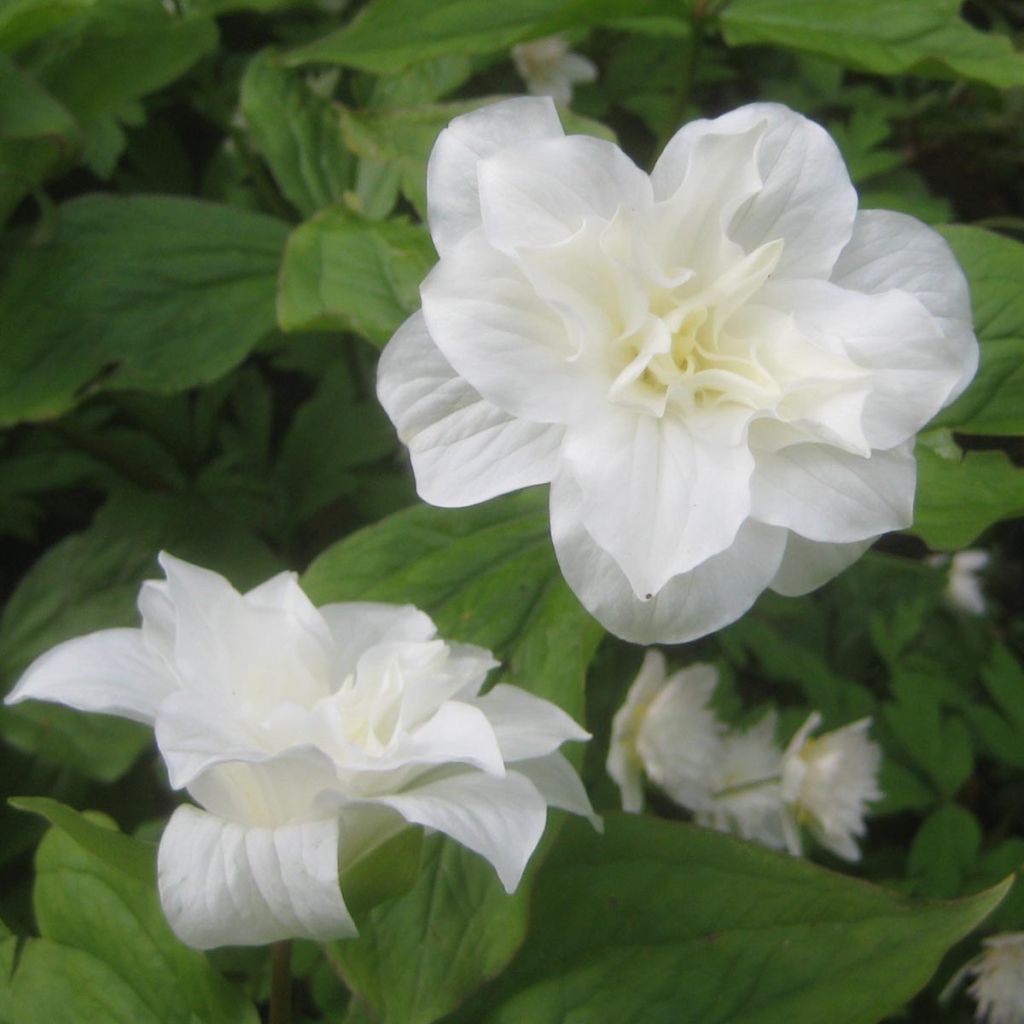

Trillium grandiflorum Flore Pleno - Trille blanc à fleurs doubles
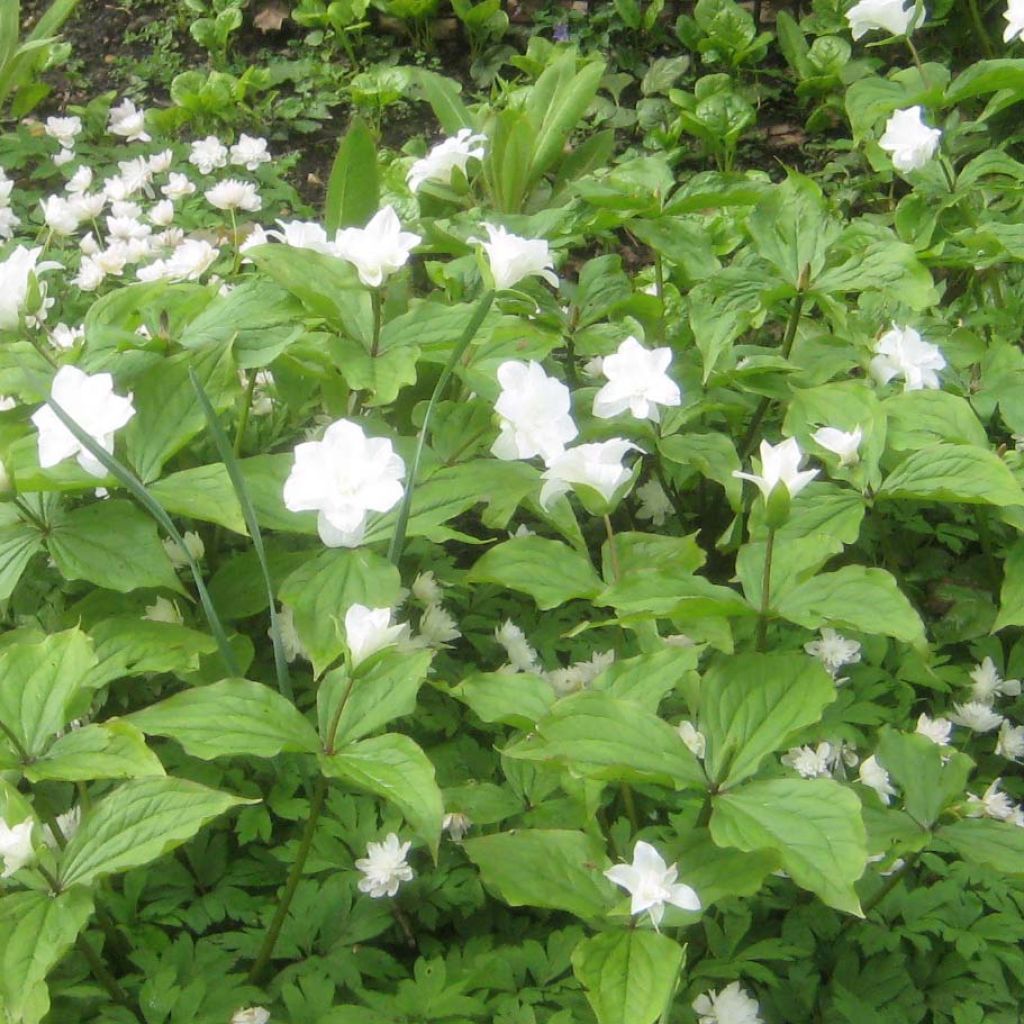

Trillium grandiflorum Flore Pleno
Trillium grandiflorum Flore Pleno
Trillium grandiflorum Flore Pleno
Large-flowered Trillium, White Trillium, Great White Trillium, White Wake-robin
Plant arrived this morning, has suffered, the little shoot is wilted; I hope it will recover.
Joëlle, 01/04/2020
Special offer!
Receive a €20 voucher for any order over €90 (excluding delivery costs, credit notes, and plastic-free options)!
1- Add your favorite plants to your cart.
2- Once you have reached €90, confirm your order (you can even choose the delivery date!).
3- As soon as your order is shipped, you will receive an email containing your voucher code, valid for 3 months (90 days).
Your voucher is unique and can only be used once, for any order with a minimum value of €20, excluding delivery costs.
Can be combined with other current offers, non-divisible and non-refundable.
Why not try an alternative variety in stock?
View all →This plant carries a 6 months recovery warranty
More information
We guarantee the quality of our plants for a full growing cycle, and will replace at our expense any plant that fails to recover under normal climatic and planting conditions.

Would this plant suit my garden?
Set up your Plantfit profile →
Description
Rare and beautiful, Trillium grandiflorum 'Flore Pleno' slowly colonizes the damp undergrowth, showing early double flowers in spring that resemble pure white Gardenias. This beautiful species arches its stems laden with beautiful deciduous foliage, very dark green. Very hardy, this perennial emblematic of northeastern America is a treasure for shade. Sometimes slow to establish, it is nevertheless one of the easiest trillium species to grow in thick humus, protected from the sun's bite. However, it takes time to settle in the garden, even in favourable conditions.
Trillium grandiflorum belongs to the Liliaceae family. This rhizomatous herbaceous perennial is native to the northern and eastern parts of North America, from southern Ontario and Quebec to New England, Michigan, Minnesota, and Wisconsin. It is a characteristic species of maple forests, which it carpets. 'Flore Pleno' is the very rare double-flowered form. From spring onwards, it forms a tuft 25 to 35cm (10 to 14in) in height, with a minimum spread of 35cm (14in). It slowly spreads in width using its rhizomes, without becoming invasive, until it forms large colonies where it thrives. Initially, a plant produces a few leaves and one or two flowers when it reaches a certain size, and then it spreads regularly. Flowering takes place in March-April, before the leafing of deciduous trees. The upright flowers, 5cm (2in) in diameter, have a very double, highly structured, pure white corolla. They are borne at the end of a stem emerging from the heart of a trilobed leaf, each division of which is ovoid, veined, in a very dark green shade. The flowering is followed by the formation of red berries that blacken when ripe, with seeds dispersed by ants. This plant, slow to establish, can live for several decades.
Also known as Canadian wood lily, Trillium grandiflorum 'Flore Pleno' is primarily a plant of cool undergrowth: it will accompany ferns, cyclamens, Helxines, nodding perennial geraniums, Arisaemas, or Solomon's Seals. It will be most effective in a wild garden, planted in shaded borders or under deciduous trees and bushes. It is also a useful plant for stabilizing the soil on cool shaded slopes, through its long rhizomes.
Report an error about the product description
Trillium grandiflorum Flore Pleno in pictures
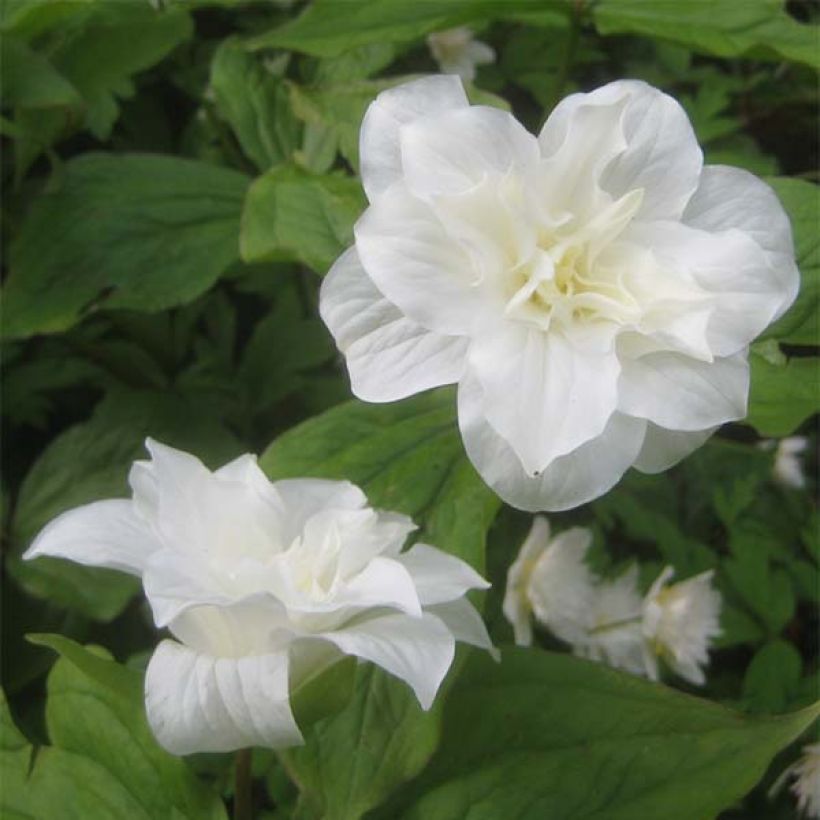

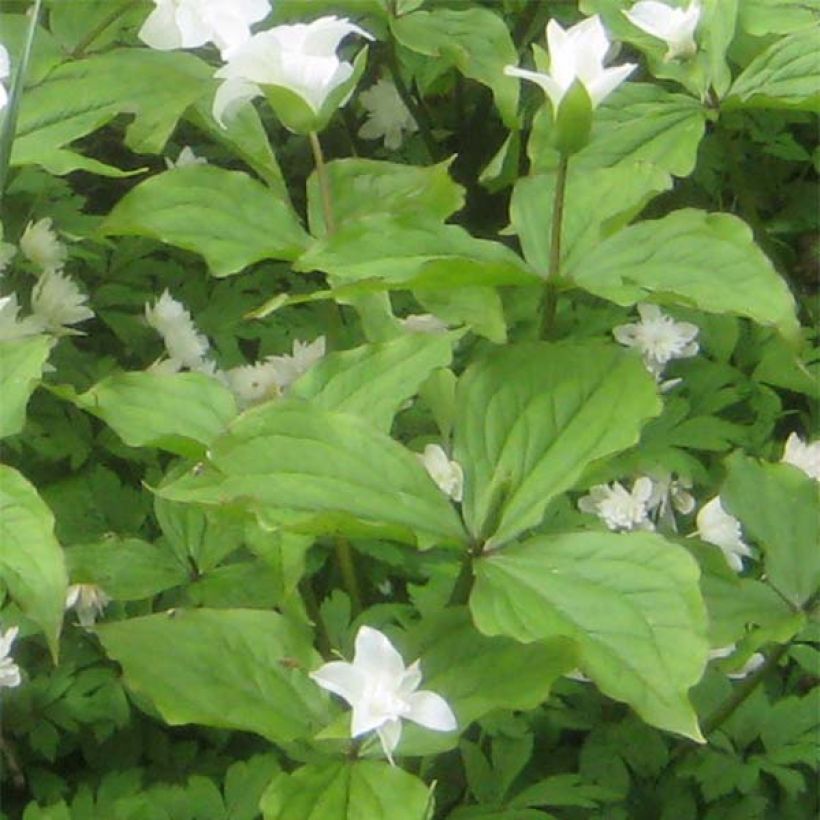

Plant habit
Flowering
Foliage
Botanical data
Trillium
grandiflorum
Flore Pleno
Trilliaceae (Liliaceae)
Large-flowered Trillium, White Trillium, Great White Trillium, White Wake-robin
North America
Planting and care
Plant your Trillium grandiflorum 'Flore Pleno' in cool and deep soil that never dries out, with a neutral to slightly acidic pH, in a shaded or semi-shaded area. Avoid planting them in limestone soil. Plant the rootstocks, the size of a finger, flat at a depth of 10cm (4in), spaced 10cm (4in) apart, in a consistently cool exposure, if possible by adding forest compost (or alternatively a good handful of dead leaves). They are very hardy and will form beautiful clumps over the years. It is also common for them to only appear the year after planting. This is a plant for experienced gardeners. In Canada, Trilliums colonize certain forests like bluebells in the forests of Oise in France and can live for several decades. But patience is required: Trilliums take a long time to establish themselves, and can sometimes be unpredictable. A plant for enthusiasts!
Planting period
Intended location
Care
-
, onOrder confirmed
Reply from on Promesse de fleurs
Similar products
Haven't found what you were looking for?
Hardiness is the lowest winter temperature a plant can endure without suffering serious damage or even dying. However, hardiness is affected by location (a sheltered area, such as a patio), protection (winter cover) and soil type (hardiness is improved by well-drained soil).

Photo Sharing Terms & Conditions
In order to encourage gardeners to interact and share their experiences, Promesse de fleurs offers various media enabling content to be uploaded onto its Site - in particular via the ‘Photo sharing’ module.
The User agrees to refrain from:
- Posting any content that is illegal, prejudicial, insulting, racist, inciteful to hatred, revisionist, contrary to public decency, that infringes on privacy or on the privacy rights of third parties, in particular the publicity rights of persons and goods, intellectual property rights, or the right to privacy.
- Submitting content on behalf of a third party;
- Impersonate the identity of a third party and/or publish any personal information about a third party;
In general, the User undertakes to refrain from any unethical behaviour.
All Content (in particular text, comments, files, images, photos, videos, creative works, etc.), which may be subject to property or intellectual property rights, image or other private rights, shall remain the property of the User, subject to the limited rights granted by the terms of the licence granted by Promesse de fleurs as stated below. Users are at liberty to publish or not to publish such Content on the Site, notably via the ‘Photo Sharing’ facility, and accept that this Content shall be made public and freely accessible, notably on the Internet.
Users further acknowledge, undertake to have ,and guarantee that they hold all necessary rights and permissions to publish such material on the Site, in particular with regard to the legislation in force pertaining to any privacy, property, intellectual property, image, or contractual rights, or rights of any other nature. By publishing such Content on the Site, Users acknowledge accepting full liability as publishers of the Content within the meaning of the law, and grant Promesse de fleurs, free of charge, an inclusive, worldwide licence for the said Content for the entire duration of its publication, including all reproduction, representation, up/downloading, displaying, performing, transmission, and storage rights.
Users also grant permission for their name to be linked to the Content and accept that this link may not always be made available.
By engaging in posting material, Users consent to their Content becoming automatically accessible on the Internet, in particular on other sites and/or blogs and/or web pages of the Promesse de fleurs site, including in particular social pages and the Promesse de fleurs catalogue.
Users may secure the removal of entrusted content free of charge by issuing a simple request via our contact form.
The flowering period indicated on our website applies to countries and regions located in USDA zone 8 (France, the United Kingdom, Ireland, the Netherlands, etc.)
It will vary according to where you live:
- In zones 9 to 10 (Italy, Spain, Greece, etc.), flowering will occur about 2 to 4 weeks earlier.
- In zones 6 to 7 (Germany, Poland, Slovenia, and lower mountainous regions), flowering will be delayed by 2 to 3 weeks.
- In zone 5 (Central Europe, Scandinavia), blooming will be delayed by 3 to 5 weeks.
In temperate climates, pruning of spring-flowering shrubs (forsythia, spireas, etc.) should be done just after flowering.
Pruning of summer-flowering shrubs (Indian Lilac, Perovskia, etc.) can be done in winter or spring.
In cold regions as well as with frost-sensitive plants, avoid pruning too early when severe frosts may still occur.
The planting period indicated on our website applies to countries and regions located in USDA zone 8 (France, United Kingdom, Ireland, Netherlands).
It will vary according to where you live:
- In Mediterranean zones (Marseille, Madrid, Milan, etc.), autumn and winter are the best planting periods.
- In continental zones (Strasbourg, Munich, Vienna, etc.), delay planting by 2 to 3 weeks in spring and bring it forward by 2 to 4 weeks in autumn.
- In mountainous regions (the Alps, Pyrenees, Carpathians, etc.), it is best to plant in late spring (May-June) or late summer (August-September).
The harvesting period indicated on our website applies to countries and regions in USDA zone 8 (France, England, Ireland, the Netherlands).
In colder areas (Scandinavia, Poland, Austria...) fruit and vegetable harvests are likely to be delayed by 3-4 weeks.
In warmer areas (Italy, Spain, Greece, etc.), harvesting will probably take place earlier, depending on weather conditions.
The sowing periods indicated on our website apply to countries and regions within USDA Zone 8 (France, UK, Ireland, Netherlands).
In colder areas (Scandinavia, Poland, Austria...), delay any outdoor sowing by 3-4 weeks, or sow under glass.
In warmer climes (Italy, Spain, Greece, etc.), bring outdoor sowing forward by a few weeks.






























